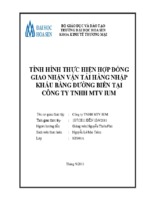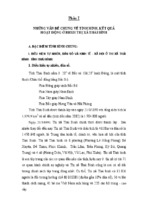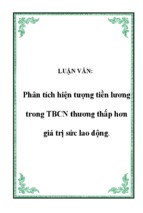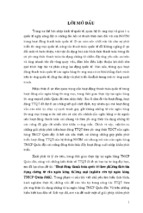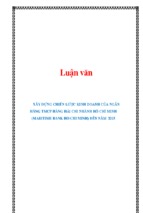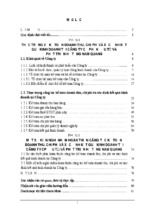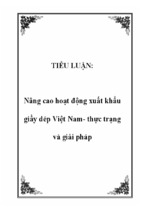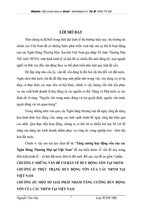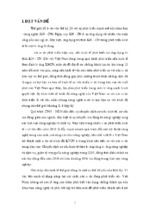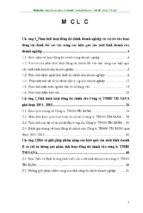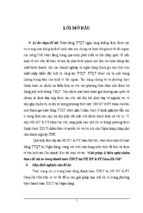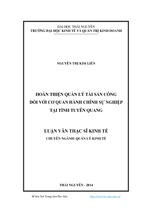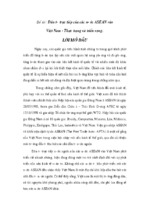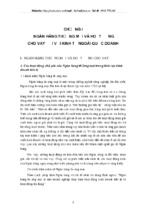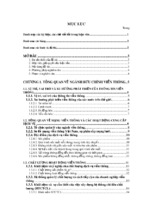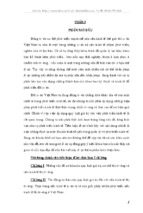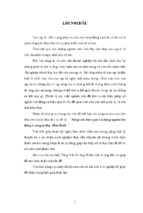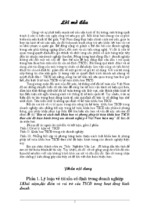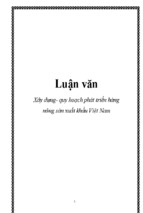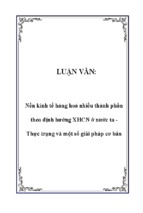MINISTRY OF EDUCATION AND TRAINING
THE UNIVERSITY OF DANANG
-----------------------
TRẦN THỊ TUYẾT ANH
A STUDY OF LINGUISTIC FEATURES
OF PROVERBS EXPRESSING SUPERSTITION
IN ENGLISH AND VIETNAMESE
Study Field : THE ENGLISH LANGUAGE
Code
:
60.22.15
MASTER OF ARTS IN SOCIAL
SCIENCES AND HUMANITIES
(A SUMMARY)
DANANG – 2013
This study has been completed at
THE UNIVERSITY OF DANANG
Supervisor:
NGŨ THIỆN HÙNG, Ph.D
Examiner 1:
NGUYỄN TẤT THẮNG, Ph.D.
Examiner 2:
TRẦN QUANG HẢI, Ph.D.
The thesis was defended to the Examining Committee at the
University of Danang
th
Time : December 14 , 2013
Venue: University of Danang
The thesis is accessible for the purpose of reference at:
- Library of the College of Foreign Languages, University of Danang.
- Information Resources Centre, University of Danang.
1
CHAPTER 1
INTRODUCTION
1.1.RATIONALE
We are living in an era of globalization and integration. English,
an international language, has been known as a very necessary means
of communication and a pivotal demand for people around the world.
In Vietnam, English has been taken much notice, and together with its
rising importance, the need of learning English is becoming more and
more urgent. It cannot be denied that every English learner want to
speak English naturally and fluently like a native speaker. For many
foreign speakers, how to communicate successfully with native
speaker is one of the biggest obstacles if we have poor knowledge of
the language itself and the language related to the culture. However,
each nation’s language contains both its similar and different cultural
concepts on many fields of life such as custom, tradition, belief,
lifestyles, etc.
Proverbs are the combination of culture, language usage and
creative competence, personality and mark of time. They are everlasting
and passed from generation to generation because of their own
distinctive features. Through proverbs, each person knows the other’s
point of view and ways of thinking. Moreover, proverbs are the true
voice of the nation, describing the way of life, feelings and thoughts of
the peoples of all time. Coming to treasure proverb is to the knowledge,
the experience, and the lifestyle of people from the past.
In ancient time, to sustain and develop life, in living by farming
areas should have better weather and human need to proliferate so
worshiping the natural gods have closed to them early. Since then the
gods was accompanied in the mind of each person. People believe in a
supreme being capable of creating the universe and human, control,
upper and lower world “God made the country, and the man made the
town”, also believe that the God with magic bless or visit calamities
on people and devout some objects, animals becoming a spirit “God
sends good luck and God sends bad.”
On superstitions in life, the more that has been transformed into
proverbs imbuing with the natural culture. It shows that, nothing else,
proverbs is both wisdom, and precipitated mood, mental identity,
aspects of human personality. Proverbs, we can say, contained in it
what is the most common, the most universal, the most clearly
reflected in bold in the human character.
Through the contact with proverbs of ethnic backgrounds,
springing from passion for folk literature, along with desiring to
further explore the harmonious beauty about content and form of the
proverb, we are pleased to contribute a view illuminated from light of
folklore about a topic interest me most: “a study of linguistics features
of proverbs expressing superstition in English and Vietnamese”.
Moreover, due to the fact that proverbs are not taken enough notice in
English learning and teaching as well as Vietnamese itself, I have
decided to choose this theme for my thesis. I hope that with all my
attempts, my study will be useful in some way to someone raising
great concern about proverbs in general and proverbs about
superstition in particular.
1.2. AIM AND OBJECTIVE
1.2.1. Aims
The study aims to
-
Study proverbs in English and Vietnamese that express
superstition.
3
-
Help the Vietnamese learner of English to be more aware of
the linguistic and cultural features as well as some stylistic
devices of English and Vietnamese proverbs and how to use
them effectively and naturally in their language skill.
1.2.2. Objectives
This study is intended to
-
Investigate the syntactic, semantic and stylistic features of
English and Vietnamese proverbs expressing superstition.
-
Analyze and compare some syntactic, semantic features of
English and Vietnamese proverbs expressing superstition.
-
Make some solutions for successfully teaching and learning
English and Vietnamese proverbs of superstition.
1.3. RESEARCH QUESTIONS
The study attempts to find the answers to the following questions:
1. What are the syntactic features of English and Vietnamese
proverbs expressing superstition?
2. What are the semantic and stylistic features of English and
Vietnamese proverbs expressing superstition?
3. What are the similarities and the differences between English
and Vietnamese proverbs expressing superstition in terms of
syntactic, semantic and stylistic features?
1.4. SCOPE OF THE STUDY
This thesis intends to study the syntactic and semantic and
stylistic features of English and Vietnamese proverbs expressing
superstition.
1.5. ORGANIZATION OF THE STUDY
Chapter 1: Introduction
Chapter 2: Literature Review and Theoretical Background
Chapter 3: Research Design and Methodology
Chapter 4: Findings and Discussions
Chapter 5: Conclusions
CHAPTER2
LITERATURE REVIEW AND
THEORETICAL BACKGROUND
2.1. LITERATURE REVIEW
2.2. THEORETICAL BACKGROUND
2.2.1. Definition of Term
a. Definition of Superstition
There are many definitions of superstition depending on the
context of the situation and the views of the person giving the
definition. Therefore, in this thesis, the term “proverbs expressing
superstition” can be defined as: proverbs expressing superstition is a
kind of proverbs that represent the belief that particular events happen
in a way that cannot be explained by reason or science and will bring
good or bad luck.
b. Definition of Proverb
Up till now, there have been lots of definitions of proverbs in
the world as well as in Vietnam. In this thesis, we will take a view “in
terms of form, a proverb is a short but complete sentence, and in terms
of content, a proverb expresses wisdom, advice, experience, a moral,
an ethics, a truth, or a criticism” to serve for the thesis.
2.2.2. Main Features of Proverbs
a. Forms
b. Syntactic structure
This thesis adopts the idea of Quirk et al (1985) for English
proverbs and the idea of Nguyen Van Hiep (2009) and Cao Xuan Hao
for Vietnamese proverbs. Moreover, this thesis also bases on Nguyen
Van Hao and Hoang Xuan Tam’s view to classify types of
comparative sentences.
Complete Sentences
English Sentence Types
- Simple Sentences
A simple sentence is a sentence includes a Subject and a
Predicate and it is usefully distinguished seven clause patterns. They
are SVA, SVC, SVO, SVOA, SVOC SVOO and SV.
- Compound sentences
A compound sentence consists of two or more coordinated main
clauses; the clauses provide classic instances of a paratactic
relationship that is they have equivalent function. [16, p. 987]
- Complex Sentences
A complex sentence consists of only one main clause and it has
one or more subordinate clauses functioning as an element of the
sentences. The subordinate clauses can be nominal, adverbial,
adjective, comparative and comment clauses. Moreover, each of these
clauses has its own sub-varieties.
Vietnamese Sentence Types
There are only three types of sentence structures in Vietnamese.
[31, p.22]
- Simple Sentences
There are five clause types: SV, SVO, SVC, SVOO and SVOC.
- Compound Sentences
In term of Compound sentences, there are such differences
between English structures and Vietnamese structures as follows:
+ Coordination Compound
+ Subordination Compound
Syndetic Subordination
Asyndetic Subordination
- Complex Sentences
A complex sentence is a kind of simple sentence, the elements
of which can be expanded in to a Subject – Predicate structure. It is
divided into three types:
+ Subject is a Subject – Predicate structure
+ Predicate is a Subject – Predicate structure
+ Complement is a Subject – Predicate structure
Incomplete Sentence
Incomplete sentence having syntactic center is noun, verb,
adjective, or verb phrase, adjective phrase, and is the main element of
sentence. It may consist of one word or more than one word. There are
five major types of phrases recognized in both English and
Vietnamese. In this thesis, we investigate only noun phrase, verb
phrase, and adjective phrase.
c. Content
The meanings of proverbs are all contents which are informed
for the speaker and listener. They contain both literal and non-literal
meanings. Proverbs which have lots of meanings (multi-meanings)
and whose meanings are figurative are often expressed via the
methods such as metaphor, metonymy, hyperbole, paradox, etc.
A proverb consists of popular knowledge and experience of a
nation about nature and outlook on life. Moreover, it plays an
important role in building people’s characters as well as educating
people what is wrong and what is right and they show people how to
live better and how to get on well with others in society and especially
it also criticizes and satirizes bad things of society.
2.2.3. Proverbs and Other related terms
a. Proverbs and Saying
b. Proverbs and Idioms
2.2.4. Relation of Culture and Proverbs
a. Relationship between language and culture
b. Proverbs and Culture
2.3. CONCLUDING REMARKS
CHAPTER 3
METHODS AND PROCEDURES
3.1. RESEARCH DESIGN
For the purpose of examining the syntactic and semantic
features as well as discovering some typical cultural characteristics of
English and Vietnamese proverbs both qualitative and quantitative
research designs were used for the study.
3.2. SAMPLING
3.3. DATA COLLECTION
3.4. DATA ANALYSIS
3.5. INSTRUMENTATION
3.6. RESEARCH PROCEDURE
CHAPTER 4
FINDINGS AND DISCUSSION
4.1. OVERVIEW
This chapter mainly discusses syntactic structures and semantics
features of proverbs expressing about superstition in English and
8
Vietnamese together to show the close link and generalize the
similarities as well as differences between them.
4.2. SYNTACTIC FEATURES OF EPsES AND VPsES
4.2.1. Syntactic Features of EPsES and VPsES in Complete
Sentences
a. PsES with Simple Sentences
In English
[1] S + V +A
Good luck lies in odd numbers.
[2] S + V + C
Ignorance is the mother of superstition.
[3] S + V+ O
The croaking raven creats dreams.
[4] S + V+ O + O
God tempers the wind to the shorn lamb
[5] S + V + O +A
Left or right, brings joy at night.
[6] S + V + O +C
Rowan tree and red thread make witches tine
their speed.
[7] S + V
Yellow forsaken and green forsworn, but blue
and red ought to be worn.
In Vietnamese:
[1] S + V + C
Người sang tại phận
[2] S + V + O
Cú kêu ra ma
[3] S + V
Tiền kiếp luân hồi
And only one item of this structure can be found among 150
VPsES. The following examples will illustrate:
[4] S + Adj.P
Chữ tài liền với chữ tai
b. PsES with Compound sentences
In English
- Syndetic Coordination: a compound sentence whose two
clauses are connected by conjunctions and, but, or.
God made the country, and man made the town
9
- Asyndetic Coordination: a compound sentence whose two
clauses are not connected by conjunctions. This pattern is presented by
parallel structure as the following examples:
[8] S + V // S + V
Specks on the fingers, fortune
lingers; specks on the thumbs, fortune surely comes
[9] S + V + C // S + V + C
The robin and the wren are God’s cock
and hen; the martin and the swallow are God’s mate and marrow. [10]
- S + V + O // S + V + O
To a red man read thy rede, with a
brown man break thy bread; at a pale man draw thy knife; from a
black man keep thy wife.
In Vietnamese
- Syndetic Coordination
Dầu ai buôn bán trăm nghề, đi ngày con nước trở về tay không.
- Asyndetic coordination
[5] S + V // S + V
Bốn chín chưa qua, năm ba đã tới
[6] S + V + O // S + V + O
Đèn có hoa, chủ nhà có lộc
[7] S + V + C // S + V + C
No ăn thì đắt bói, đói ăn thì đắt khoai
[8] S + V + A // S + V + O
Đời cha ăn mặn, đời con uống nước
c. PsES with Complex Sentence
In English
- Adjective clauses
The God who gave us teeth will also give us
bread
- Nominal clauses
A dream grants what one covets when awake
- Adverbial Clause
When bad luck chooses you as a companion,
even a ripe banana can remove your teeth.
In Vietnamese
[9] S – P Subject is a subject – Predicate Structure
S [S + V] + V
Hùm tha có số
[10] S – P Predicate is a Subject – Predicate Structure
S + V [S + V]
Tay chiêu đập niêu không vỡ
d. PsES with Comparative clause
In English
- Differentiating comparison
It is better to be born lucky than rich.
In Vietnamese
- Equational comparison
Phải duyên thì dính như keo, trái
duyên chổng chểnh như kèo đục vênh
- Differentiating comparison
Tốt số hơn bố giàu
4.2.2. Syntactic Features of EPsES and VPsES in
Incomplete Sentences
a. Omitted Sentences
In English
- Subjectless Sentences
Touch wood: it’s sure to come good
- Verbless Sentences
Whitsunday (is) wet, Christmas (is) fat.
In Vietnamese
- Subjectless Sentence
(Đức phật) siêu độ chúng sinh.
b. Parallel Structure
- Noun Phrase
[11] Adj + N // Adj + N
Cold hand warm heart.
[12] N + prep + NP // N + prep + NP
Son of a priest, grandson of
the devil.
- Verb Phrase
[13] Verb + PP// V + PP
Marry in may, rue for aye.
- Adjective Phrase
[14] Adj + PP // Adj + PP
Lucky at life, unlucky in love.
[15] Adj P // Adj P
The more wicked, the more lucky
11
In Vietnamese
Similar to English proverbs, Vietnamese proverbs also have
some PsES in parallelism form. Among 150 VPsES investigated
proverbs with parallel structure accounts for 22,7% with 34 items
What follows are some illustrations:
- Noun Phrase
[11] Noun + Adj/AP // Noun + Adj/AP Gái hơn hai, trai hơn một
[12] N + (nào) // N + (nấy)
Chùa nào, bụt nấy
[13] N/NP + NP // N/NP + NP
Trai tay trái, gái tay mặt
[14] Num + NP // Num + NP
Nhất duyên, nhì phận, tam
phong thổ
[15] N + V // N +V
Con cầu, con cúng
- Verb Phrase
[16] V + N / NP // V + N / NP
Ăn chay, niệm phật
[17] VP + VP // VP + VP
Có thóc cúng thóc, có
tiền cúng tiền
[18] V+ Adj // V + Adj
Sinh dữ tử lành
[19] V + N // Adj + A
Nghe thầy bói, đói rã họng
- Adjective Phrase
[20] Adj + VP // Adj + VP
May gặp duyên, chẳng
may gặp nợ
[21] Num + Adj // Num + Adj
Nhất lé, nhì lùn
[22] Adj + AP // Adj + AP
Giàu tại phận, khó tại duyên
[23] Adj + Noun // Adj + Noun
Giầu giờ ngọ, khó giờ mùi.
4.2.3. Syntactic Similarities and Differences of EPsES and
VPsES
a. Similarities
In general, PsES under study in both English and Vietnamese
12
are constructed in simple, compound, complex and comparative
sentences. In term of simple sentences, the patterns SVO, SVC and
SV are found in both of them. One more common point found is
that the comparative structures are used in both EPsES and VPsES
with comparative markers as … as, than. And another similarity is that
both languages have parallel patterns. Parallel patterns appear in both
phrase structures as well as sentences structures.
b. Differences
The study also points out some differences between EPsES and
VPsES. The first difference can be seen in the use of other types of
sentence structures. The second difference is parallelism forms, in
opposition to VPsES, EPsES own a limited number of all three types.
Unlike English proverb, a lot of Vietnamese proverbs have rhymes
which help them to sound more musical, expressive and beautiful. In
short, The Vietnamese people tend to use prosodic feature more
frequently than the English one. By this way, proverbs can be easily
memorized.
4.3. SEMANTIC FEATURES OF EPsES AND VPsES
4.3.1. Semantic field of EPsES and VPsES
a. Superstition and God – Buddha - ghost
Superstition and God always have a close relationship because
God is the best way for superstition to evolve. God created everything
and we are part of his creation, which is put on all the other creatures
to govern all living.
(4.85) - God made the country and manmade the town
Unlike English, Vietnamese proverbs of God, Buddha cover a
large rate in the corpus. The Vietnamese believe "Ông Trời" can see
all the things happening in the world. Nothing he does not see, do not
13
be. And he who is very fair, fair payoff. This confidence is expressed
in the proverb as:
(4.89) - Đi đâu cho khỏi lưới trời
Ở đâu cho hạp mệnh trời mới êm
b. Superstition and Fate
It is believed that everything happens for some reason. When
they cannot find a suitable explanation to a problem, they usually
think that it caused by the arrangement of fate.
(4.98) - Our hairs are numbered
The Vietnamese people have tendency to believe more in the
fate than the English people do. So it is not difficult for us to see many
proverbs of superstition and fate. There is rich fate, there is also poor
fate: “Số giàu tay trắng cũng giàu, số nghèo chín đụn mười trâu cũng
nghèo”.
c. Superstition and Good luck
Although no one knows when the concept of good luck has
formed in the human mind, through many generations it becomes a
cultural feature of life in many countries around the world. Along with
a lot of good luck, a logical system of wisdom and other good luck has
also been selected and handed down from generation to generation in
the inventory of both EPsES and VPsES.
(4.105) - Turn the money in your pocket when your hear the
cuckoo
(4.108) - Ra ngõ gặp trai, vừa may vừa mắn
d. Superstition and Misfortune
Like English, in Vietnam, it is said that “Trong họa có phước,
trong phước có họa”(misfortune has its uses) in our life, never just
14
good luck or bad luck all that they are interwoven, creating imprints of
every human’s life, makes life more spicy. For example
(4.111) - A whistling woman and a crowing hen are neither fit
for God nor men
(4.113) - Ra ngõ gặp đàn bà, ở nhà hơn đi
e. Superstition and Marriage
(4.115) - They that marry in green, their sorrow is soon seen.
According to an old superstition, everything that was green was
regarded as out of place at a wedding. Even green vegetables were
forbidden; for it was believed evil was sure to result if the color was
anywhere to be seen. And the Vietnamese people believe that people
having a predestinated love tie can become husband and wife. If
people have predestined lovers, they can also meet together even
thousands of miles away. Perhaps, in the sentiment life, the word
“duyên” plays an important role not only in marriage but also in many
other relationships as intimates and friends … etc.
(4.121) - Vợ chồng phải duyên phải kiếp
f. Superstition and physical characteristics
The characters of English people also are reflected in many
ways through proverbs for example: the proverb “cold hand, warm
heart” is used to refer to a person who outside is very cold but in fact,
he is a very warm and kind heart. And in Vietnamese
(4.129) - Nốt ruồi ở cổ có lỗ tiền chôn (Through mole)
(4.132) - bà sang sảng tiếng đồng, chẳng vất vả đường chồng
cũng vất vả đường con (Through voice)
g. Superstition and Days – Time - Age
Human life usually happen so ups and downs but you have the
chance to be happy again no more. So if you know to coordinate
15
exactly good times with the great problems such as marriage,
changing occupation, developing business, your life will be better.
(4.134) – A growing moon and a following tide are lucky times
to marry in Fortune smiles on a happy bride
(4.141) - Chớ đi ngày bảy về ngày ba
h. Superstition and Omens
Omens are thought by many to be a portent that precedes a
significant future event. Let’s consider some proverbs about omens
(4.145) - Soon tod, soon with God
“Tod” here means “having teeth”. The proverb implies that
babies who cut their teeth early will die young.
The Vietnamese has proverb “Thứ nhất đom đóm vào nhà, thứ
nhì chuột rúc, thứ ba hoa đèn” three phenomena are brought good
omen to the owner, but in varying degrees. The dealers love to see
these omens, especially the fireflies on the merchant is sure that
tomorrow will be “in the black”
i. Superstition and Good – Evil – Nemesis
Many Vietnamese people believe in the causality: “Ở hiền gặp
lành, ở ác gặp ác” (one good turn deserves another). They cultivate
virtue and morals, practice charity, avoid committing some evil acts so
that they can up to nirvana. Whatever you do, they have cause and
effect. Committing evil, not suffer in next incarnation but also will pay
for evil deeds in this incarnation. Moreover, what parents do, also
affecting to their children
(4.163) - Đời cha ăn mặn, đời con khát nước
j. Superstition and Taboo
It is the farmer with the concept "Có thờ có thiêng, có kiêng có
lành" (there is no worship without sacredness, there is no taboo
16
without luck) that has contributed to hand down the taboos in their
lives
(4.167) - Never speak ill of the dead
(4.168) - Cưới vợ kiêng tuổi đàn bà, làm nhà kiêng tuổi đàn ông
k. Superstition and The superstitious
Superstition is the fear of what is unknown and mysterious. It is
the belief that certain events bring good or bad luck which cannot be
explained by reason or science.
(4.172) - Nothing but what is ominous, to the superstitions
Vietnamese proverbs did not hesitate to expose the game "Buôn
thần bán thánh" (to perform simony) of the chiromancer, the
cartomancer. In the eyes of a folk part, the cartomancer is only a tricky
fellow: “Thầy bói nói dựa” “Bói ra ma quét nhà ra rác”.
4.3.2. Stylistic Devices of EPsES and VPsES
a. Simile
Let us consider these examples:
(4.177) - As hot as hell
(4.181) - Lễ Phật quanh năm không bằng ngày rằm tháng giêng
In proverb (4.177), Considering hot and hell, two images belong
to different categories, hot is an adjective, a high temperature and hell
is the place believed to be the home of Devils and where bad people
go after death but have one feature in common, that is both of them
can bring an uncomfortable and unhappy feeling to people. In other
words, it is feeling or states of human being that is intensified by
means of simile.
b. Metaphor
Let us consider metaphor in the following examples:
(4.185) - Life is a dream from which death wakes us up
(4.186) - Chồng già vợ trẻ là tiên, vợ già chồng trẻ là duyên nợ
nần
17
In this proverb, an old husband and a young wife is a good
couple but contrary to an old wife and young husband is bad thing.
The identification between the concrete - an old husband and a young
wife, and the abstract - fairy; an old wife and young husband - a tragic
fate, which suffered from choosing wrongly, has made a great effect
upon shades of meaning and increase vigour of fresh connotation to
the language.
c. Antithesis
(4.189) – Lucky at life, unlucky in love
(4.190) – Xởi lởi trời cho, co ro trời co lại
Here the contrasting pairs such as xởi lởi - co ro, cho - co lại,
are also arranged in symmetry. Semantic content between the pairs of
words corresponds to each other on two parts on two parts of these
proverbs.
d. Hyperbole
Here are some other examples of hyperbolic proverbs, which
strike us by the hyperbolic elements:
(4.193) - The tree that God plants, no wind hurts it
(4.194) – Đàn ông miệng rộng thì sang, đàn bà miệng rộng tan
hoang cửa nhà
In the example of (4.194), the two concepts “wide-mouthed
men” and wide-mouthed women” are put in parallel to help the
readers or the hearers to have an impression of physical appearance in
proportion at first. In fact, the women’s wide mouth cannot be strong
enough to make her home be ruined. The hyperbole is expressed in
such an interesting way that its power can get the hearer to be more
interested in what is being expressed.
18
e. Personification
(4.198) - Misfortunes come on wings and depart on foot.
(4.201) - Ba mốt bước qua, ba ba bước lại
Misfortunes “come” or “depart on foot”. These examples are all
ways where personification is used to make ordinary objects or
abstract concepts essentially come alive and provide more of an action
for the listener. It emphasizes a lot of disaster, unfortunate rush down
not only once but also in consecutively.
f. Metonymy
Surprisingly, it is shown in the study that metonymy is rarely
used in both two languages. We can find only one Vietnamese
superstition related proverb using metonymy while this stylistic device
is not even used in the corpus of proverbs expressing superstition. For
example:
(4.203) – Chân tâm tức phật
4.3.3. Semantic similarities and differences of EPsES and
VPsES
a. Similarities
Through the examples and their analyses, it can be realized that
the proverbs expressing superstition in both English and Vietnamese
show the conceptions and advices which are collected in working and
living. What is more, stylistic devices such as metaphor, similes, and
antithesis appear a lot in both English and Vietnamese proverbs,
which make these proverbs, become more imaginary, diverse and
persuasive in transferring their implications.
b. Differences
Apart from similarities above, we have also discovered some
differences between EPsES and VPsES. Apart from similarities above,
- Xem thêm -

